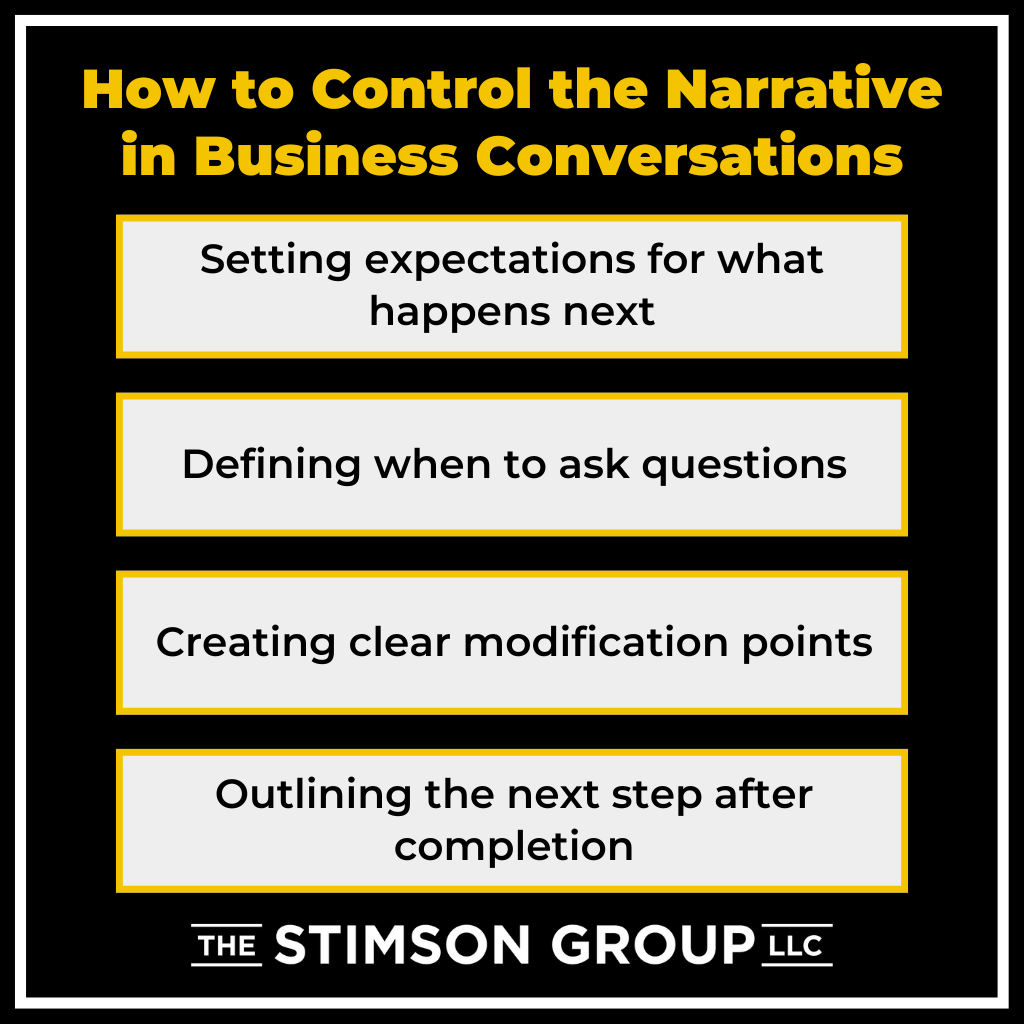
Listen instead on your Monday Morning Drive:
Relationships don’t close deals. They don’t manage teams. They don’t sell businesses.
Relationships give you permission to control the narrative. That’s the only reason they matter in business.
Too many business owners say, “It’s all about relationships!” to justify spending time on activities that don’t move the needle. They network endlessly, take clients to lunch, and chat with employees about their weekends.
Then they wonder why their sales stall, their teams underperform, and their exit strategies fall apart.
The relationship is just the entry fee. What matters is what you do once you’re in the door.

Control the Narrative or Lose the Deal
Controlling the narrative means:
- Setting expectations for what happens next
- Defining when to ask questions
- Creating clear modification points
- Outlining the next step after completion
Miss any of these, and you’ve lost control. Once you lose control, you’re playing defense instead of offense. You’re reacting instead of leading.
This applies everywhere in your business (sales, management, succession planning), but most people never learn how to do it right.
Sales: Book the Next Call, Not the Close
Your job in sales isn’t to close the deal. Your job is to book the next call. The deal closes itself when you control the narrative properly.
Here’s what most salespeople do wrong: They try to accomplish everything in one conversation. They overwhelm the buyer with information and push for commitments before trust exists.
Smart salespeople take smaller bites.
First call: “I’m Tom from XYZ Production. You handle vendor selection for national sales meetings, correct? I’d like to bring my team to discuss how we might help. Can we set up 30 minutes next week?”
Buyer: “We don’t start that process until October.”
Response: “Perfect. Can I call you mid-September to schedule something for October?”
You just controlled the narrative. You set expectations (brief intro call), created space for questions, and defined the next step.
Most salespeople would’ve launched into a capabilities presentation. Or worse, they’d say, “Great, I’ll follow up” without booking anything specific.
Every sales conversation follows this pattern: Create the expectation of what this call accomplishes, explain what happens if we’re successful (the next call), and give the buyer the opportunity to modify or ask questions.
Take one bite at a time. Set up the next conversation before ending the current one. The deal closes when you’ve successfully booked enough next calls to get there naturally.

Management: Define Success Before They Start
Bad managers give vague instructions and hope for good results. Good managers control the narrative from task assignment through completion.
Stop saying, “Run this cable for me.” Start saying, “Run this cable down this wall and straighten it out. If cables cross, stop and re-sort from the beginning. If you run short, come see me. When you’re done, I’ll show you how to dress it.”
You’ve just:
- Set clear expectations (what “done” looks like)
- Created decision points (what to do when problems arise)
- Defined the next step (cable dressing instructions)
Your team knows exactly what success looks like. They know when to make decisions and when to ask for help, and they understand what happens after completion.
This same process works for defining projects, creating tasks, or leading thinking exercises:
- Tell them what completion looks like
- Give them a rubric for making decisions or getting help
- Remind them what happens after completion
- Repeat with the next task
The know-it-all stagehand who wants to explain their whole process? Cut them off. “Here’s what I expect. Use your expertise. If you hit these specific issues, do this. Come see me when it’s done.”
You maintain control while respecting their knowledge.
Your best project managers and team leads already do this. They don’t just assign tasks. They control the entire narrative from assignment through completion.
Exit Strategy: Overdeliver Before They Ask
When you’re ready to sell your business, install new management, or transfer to employees, you need to control the narrative.
Most business owners lose control the moment due diligence starts. Buyers request documents. Sellers scramble to provide them. Buyers ask for different formats. Sellers scramble again.
You’re playing defense from day one.
Winners have their ducks in a row. Make sure your accounting, data, and documentation are so well-prepared that you exceed due diligence expectations before anyone asks.
When buyers say, “We’d like to see the numbers this way,” you show them those numbers already exist (they just missed that tab in the spreadsheet). Now you’re controlling the narrative and making people want to own your company.
Being over prepared sets buyers back on their heels. You’re demonstrating operational excellence and showing them a business that runs better than anything else they’ve evaluated.
The same applies to management succession or employee buyouts. Don’t wait for them to define the terms. Present a complete package that exceeds expectations. Control the narrative from the first conversation.
The Relationship Trap
People love talking about relationships because it feels like progress without requiring results.
“I’m building relationships” sounds better than “I’m not closing deals.”
“My team trusts me” sounds better than “My team misses deadlines.”
“We have good chemistry” sounds better than “The buyer went with someone else.”
Relationships without narrative control are just expensive friendships. You might enjoy the conversation, but you won’t achieve the outcome.
Trust gives you permission to attempt to control the narrative. Without trust, nobody listens. But trust alone accomplishes nothing. You need to use that trust to move forward, one controlled step at a time.
Start Taking Control Today
Pick one area where you’re not controlling the narrative:
In sales: Stop trying to close on first calls. Book the next conversation instead. Create smaller steps that move deals forward without overwhelming buyers. Force yourself to end every interaction with a scheduled next step.
In management: Stop giving vague instructions. Define what success looks like, when modifications can happen, and what comes next. Break large projects into controlled stages. Create clear decision rubrics for your team.
In succession: Stop waiting for others to define your exit. Prepare documentation that exceeds expectations. Present complete packages that put you in control from day one.
The narrative doesn’t control itself. Every conversation without clear next steps is a missed opportunity. Every project without defined success metrics wastes time. And every exit strategy without preparation hands control to someone else.
Stop hiding behind relationships. Start controlling narratives.





Leave a Reply